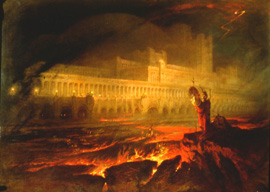
November 26, 2016

"Pandemonium" by John Martin
Recently we stayed a few days in Belgium with friends who had very well-brought-up children, that is to say polite and with excellent manners without having had their own personalities extinguished or crushed by formality. They were respectful of their elders without being obsequious and it was a pleasure to be with them, at least for us. It came as a kind of relief to meet such good young people (who were better than I ever was). Perhaps the end of civilization is not nigh after all, but will continue even after our deaths.
Nevertheless, my friends and I spent a couple of happy days lamenting the state of the world”there is, as always, much to lament”until suddenly my friend said, “Perhaps we complain too much.”
This was obviously true. We personally had very little to complain of. We were prosperous and in reasonable health, and at most suffered the irritations consequent upon daily existence rather than serious injustices. In fact, I haven”t suffered a serious injustice in my entire life. The three occasions on which I was arrested (all in foreign countries of dubious jurisprudence) were farcical rather than frightening. I have never had to perform backbreaking labor for a pittance and all the work I have done has been interesting, even absorbing. I have always been able to adapt my tastes to my income and if I have been mildly goaded by ambition, it has not been entirely worldly. I have always had good friends and insofar as I have ever been unhappy it was a long time ago, in my childhood. I got my unhappiness over with very early in my life. I therefore have much to be thankful for.
And yet my career has been one of complaint, admittedly not about my own situation, but rather about the condition of the world”the very world that has given, or allowed, me a good life.
But part of what the world has given me is imperfection to complain of, for what would there be to write or even think about in a world without problems? Each of us can easily think of a thousand hells, but even a single heaven is unimaginable to us.
I suspect that if people were asked to describe a heaven, they would come up with something very like an eternal cruise on one of those dreadful ships that ruin the appearance and atmosphere of everywhere they dock: five meals a day, a casino, cinema, sauna, swimming pool, dinner at the captain’s table. But such a life would soon pall. Before long there would be quarrels, divisions into factions, and possibly even a murder or two, just for variation. Man is not so much a problem-solving creature as a problem-creating one; and as for his state of mind, he likes change for its own state, even if it be change for the worse. Man will never be entirely sensible.
One has only to read of the Muslim conception of heaven to realize just how limited and mediocre is Man’s conception of bliss.
As to hells, not only is it easy to imagine them, but their variety is infinite. They do not need to consist of such crudities as eternal boiling in oil, or Bosch-like tortures that go on forever. We each have our own idea of what would be intolerable. One of my hells would be a ceaseless televised basketball game with loud commentary and shrieking spectators from which I could neither avert my eyes nor stop my ears: I find even five minutes of it appalling, let alone the prospect of an eternity of such entertainment. Then there is a hospital committee meeting in which the Director of Quality Assurance talks forever of his vision for improvement of patient services. There are indeed a million possible hells.
There is no possible perfection on earth because Man creates ever new dissatisfactions for himself. His desires are contradictory: He wants peace and excitement, stasis and novelty, freedom and limits, appetite and its satisfaction, his cake and to eat it. The total number of satisfactions can therefore increase without a decrease in the amount of dissatisfaction. That is why the process of reform will never be done. No sooner is one alleged injustice, unfairness, or obstacle to contentment removed, than another is found equal to the last, especially where there is no religious belief and no real struggle for existence. I fully expect by the end of my life to see a struggle for the legalization of polygamy, polyandry, incest, and necrophilia, for all the “rational” arguments are in favor of them, and after all it is the struggle, not the result, that counts. It is more blessed to travel than to arrive, more enjoyable to fight than to vanquish. Victory is always disappointing: post coitum omne animal triste, every animal is sad after coitus, satisfaction of desire is never as satisfying as it is expected to be and brings its own dissatisfaction.
Pessimists are better fun than optimists and have all the best jokes, as the devil was said to have all the best tunes. It is difficult to think of an optimistic comedian. A world of optimists who expect, as Dr. Johnson puts it, that age will perform the promises of youth, and that the deficiencies of the present day will be supplied by the morrow, would be like a church in which a crooked evangelist preaches an eternal sermon.